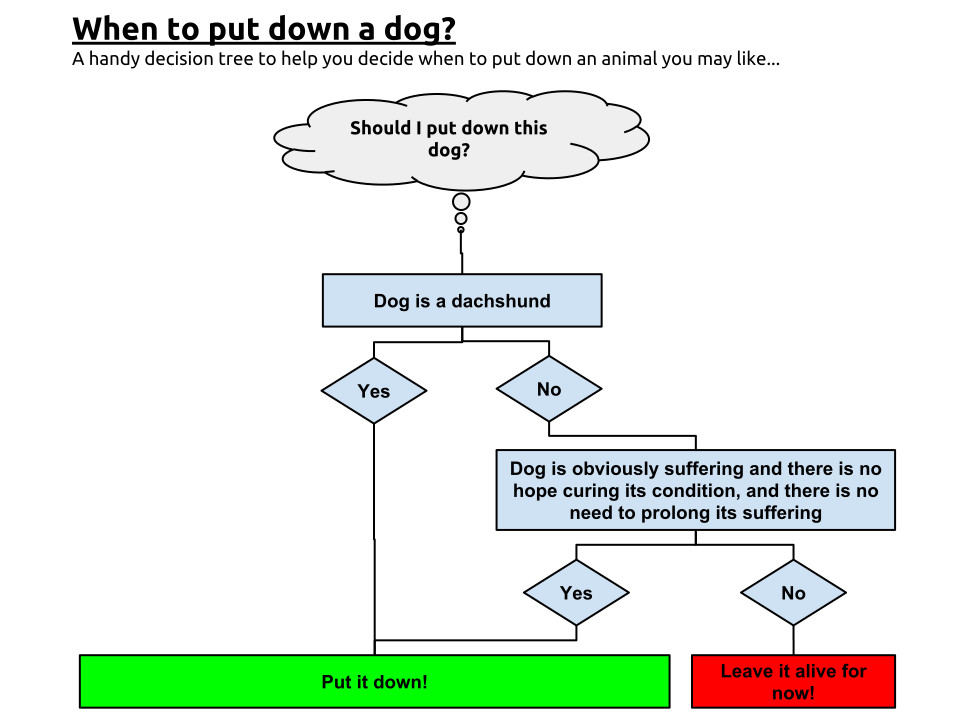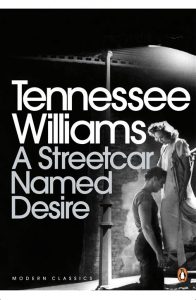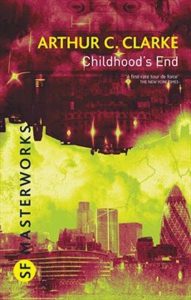f782756b9274677f19d2c1fbdb7c7487
Blog
8f0c5f3175b5ec338a6e768cab312fc7
f782756b9274677f19d2c1fbdb7c7487
9c4ceaa99dc4013546e33c75328a02df
eb4e365d4b50188825a6a861812a9662
9c4ceaa99dc4013546e33c75328a02df
eb4e365d4b50188825a6a861812a9662
8f0c5f3175b5ec338a6e768cab312fc7
f782756b9274677f19d2c1fbdb7c7487
8f0c5f3175b5ec338a6e768cab312fc7
f782756b9274677f19d2c1fbdb7c7487
Deciding when to euthanise your dog
“You might be asking yourself the question, “should I put my dog down?” When is it the right time to say goodbye to a beloved dog?

Deciding to humanely end the life of a suffering pet can be a struggle. In fact, euthanasia might be one of the most difficult choices you will ever have to make for your pet. There is no “one-size-fits-all” answer to this question.”
(from The Spruce Pets)
That’s why I have made this handy decision tree to ease you into making this important decision about your dog’s life:

And if you are still unsure, remember:
 … of doggy euthanasia!
… of doggy euthanasia!
Ninth book of 2018: John Steinbeck – The Grapes of Wrath
Following a short play, A Streetcar Named Desire, I thought I could dare a longer read… I have always been a fan of Steinbeck; I probably favour his and Anton Checkov’s works the most of all the books I’ve read.
I have read a number of Steinbeck books. Cannery Row was very memorable to me the first time I read it and quickly became a favourite of mine. A while later I discovered Fat Thursday, then Of Mice and Men. I also watched East of Eden, the classic with James Dean, a few times in my time.
However, I have not had the pleasure of reading The Grapes of Wrath.

I had heard of the work, I knew it was of his best, but I was still so impressed by the book when I read it.
The book takes place during the times of the Oklahoma Dust Storms, a period I was not that familiar with. It describes the adventure of the Joad family, a family of Oklahoma farmers, that struggle to make a living and survive in a time of depression, drought, and economic hardship.
The Joads are numerous and the family spans three generations. There are three young children under or around the age of ten. There’s Tom Joad, who is the central figure of the story, there’re his brother and his sister. Tom’s parents, as well as Tom’s grandparents, make the family house complete. As they have already lost their farm, we are introduced to the Joads as they are already in the final planning stages of making their way to California. California, so it is promised on a hand-note Tom’s father has, is a country full of fruits, vegetables, wine and plenty of great farm-land where work is plentiful and the Joads hope to make a new life in the West.
They sell whatever they can, buy an old jalopy to get them from Oklahoma to California. They strap and tie as much of their belongings to the car as they can and also offer the local priest to come with them. The priest is no longer a priest, albeit the Joads still think of him as a man of God. He seems a good man, a smart and just fella that later in the book becomes important.
The book follows the Joads for every other chapter in the book. Every chapter, so it seems, is intersected with a brief narration of what happened in the US at the time. It tells of the many struggles of people that fled their homes due to economic catastrophes, how they made their way by the hundreds and thousands to the West, crossing the desert in old cars, with their whole families and what awaited them when they finally got to California.
The book gives provides a fascinating and believable story of the Joads, but it is the context the small intersected chapters provides that really make this such a moving book.
It may well be timeless, but I felt that it is incredibly relevant in today’s world. Today we have masses of economic migration happening all over the world and, if it’s to be believed, it’s only going to get worse. And in this time, it becomes so vital that we take learnings from the past.
In the 1930s it was American migrants, people from Oklahoma, Kansas or Arkansas that uprooted their lives to seek new opportunities in the West, in California. They were ostracised, called names, degraded of their humanity, spat on by the local residents and abused as workers. Today it’s people from elsewhere in the world. Steinbeck’s criticism is strong and applies very well to today’s resurgance in nationalism. The same sneers and insults, the same language is applied to degrade people of their humanity.
But Steinbeck’s criticism also extends to capitalism and how it’s used the abundance of workers to the farm and factory owners’ advantage. How wealthy people with land or industry can dominate those that have nothing and are in need of food. He describes the hungry children and the desperation that is felt by all of those that came in search for a better life.
There is a brief period in the book in which the Joads almost make it, where they can almost stay and live. Otherwise, it seems, their situation is getting worse and worse. They are good people and reading their story, they grow on you. So, as a reader, you are naturally upset by the drama and disaster that befalls the family.
I cannot recommend this book highly enough.
The next book I read was On The Road, by Jack Kerouac. I will follow up with that summary shortly.
Eights book of 2018: Tennessee Williams – A Streetcar Named Desire
It’s been a while since I updated my reading section. I’ve read five books in the last three months and will try to write a brief summary of what I’ve read here today. I hope that I roughly maintain their order.
The first one on that list is Tennessee Williams – A Streetcar Named Desire.

I am not unfamiliar with Tennessee Williams’ work. I vaguely remember reading The Glass Managerie in high-school and I watched a number of his plays. I was, however, not familiar with A Streetcar Named Desire. I have heard of the story and elements of it are often parodied in popular culture and I get that it’s a reference to this book, but I haven’t read it or seen it as a show. So I was quite excited about reading it.
The play takes place in New Orleans in, I presume, the late 1930s to early ’50s. The main protagonist is Blanche Dubois who comes to see her sister Stella. The sisters apparently come from a good standing and, although Stella must’ve left her wealthy family behind, it becomes clear that Blanche never really had to work for a living. She’s a teacher, but it seems that this has been a career choice of passion, rather than a way to guarantee her independence.
Following the death of her father, the family estate has collapsed, the family home sold and Blanche seems to be left destitute and broken. For months before coming to her sister’s home, she must have relied on the kindness of those around her. But as this dried up, she is left with little options.
Taking said Streetcar Named Desire, she arrives in her pregnant sister’s home. It’s a small home, not what Blanche is used to. She’s even less used to the brutish, crude husband of Stella, Stanley. And Stanley cannot tolerate Blanche, who is in a vulnerable and fragile mental state, after seeing her world collapse around her. Blanche drinks a lot, drinks to forget her sorrow and worries. I guess she hopes to stay indefinitely, but as she sees that this would be impossible with Stanley, she looks to see if she can find a suitable husband in Stanley’s friends.
She successfully goes on a date with Mitch, a poker-friend of Stanley’s. And Blanche is trying her best to make Mitch fall for her. However, due to her drinking and mental health issues, their affair isn’t consummated. Stanley, possibly out of worry for his friend, potentially out of distrust of Blanche, researches Blanche’s recent whereabouts. He finds out that she was, for a while, prostituting herself and that this was the reason for why she’s lost her job as a school-teacher.
This is too much for Mitch, he considers her indecent and unclean. He won’t marry her. This was, so Blanche sees it, her last chance to escape complete destitution and homelessness. Blanche, confronted – and quite obviously raped -by Stanley, loses her mind completely and, at the end of the play, is sectioned in a mental hospital.
I enjoyed reading this play. For one, it was very quick to read – and I don’t mean that it was just slim. Which it was, but still! It is an easy play to read, the dialogue, albeit a bit dated, is easy to comprehend and follow. The characters are believable, albeit quite polarised. Blanche, the Southern Belle, that’s lost her standing in high-society, who drowns her thaught in alcohol. And Stanley, who’s seemingly all brute and testosterone.
Seventh book of 2018: Arthur C. Clarke – Childhood’s End
A Farewell to Arms left me quite stunned. It was quite a heartbreaking story and so I yearned for something easier again. I also managed to order Childhood’s End, by Arthur C. Clarke, a book I wanted to read ever since I learned that the song of the same name on the Pink Floyd album, Obscured by Clouds, is named after the book.
Getting a copy was a bit inconvenient, as I bought two other Arthur Clarke books, both from the SF Masterworks series from the publisher Orion Books. I wanted to have Childhood’s End from the same series, for bookshelf-vanity reasons. But a paperback was nowhere to be found and I turned to emailing the publisher itself. They, in turn, explained that they don’t own the rights to the paperback. Those were sold separately in the past, and, for some unknown reason, they bought the hard-back rights for this book only. -Mmmh!
Anyhow, I bought it as a hard-back and we will see how it looks in the bookshelf.

It turned out that the story is one that I was vaguely familiar with. I think I must have watched parts of the SyFy series of the same name and forgotten about it completely. I did remember parts of the story, some more well than others…
The story describes what would happen if Earth was taken over by a benign alien overlord or Overlords. They do not show themselves to mankind, but their spaceships are visible allover the large cities dotted across the planet. They bring about reforms and world peace and ask little in return. Well, they forbid mankind from leaving the planet, until further notice.
The book doesn’t have a single main protagonist and takes place over multiple generations on planet Earth. However, there is one Overlord throughout the book. His name is Karellen and he describes himself as Earth’s supervisor.
There are few people that openly resist the alien Overlords as most people are happy and satisfied with the luxury and prosperity the Overlords bring about. There is also little a resistance could do against the might of the interplanetary force of the Overlords.
So live continues for fifty years until the Overlords finally reveal themselves to mankind. And it is quite a surprise for they seem to have been here before. Spiked with other mysteries, alien deceit and a surprising finale, the novel was quite an entertaining read and a welcome break after the heavy-ended Hemingway book I read before.
As a next book I picked A Streetcar Named Desire by Tennessee Williams, a play I heard a lot of but never actually saw. I do like other Tennessee Williams plays and I am sure to find it very enjoyable.



